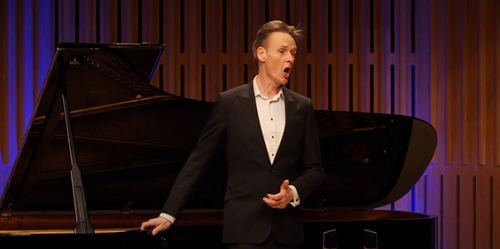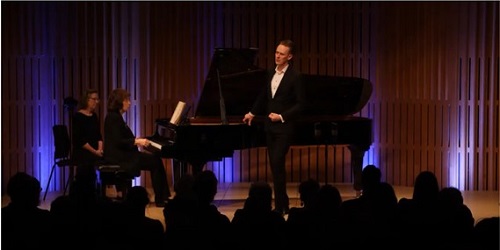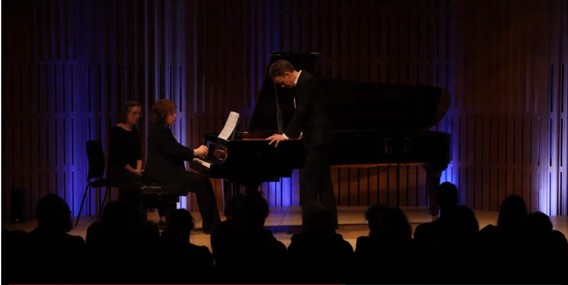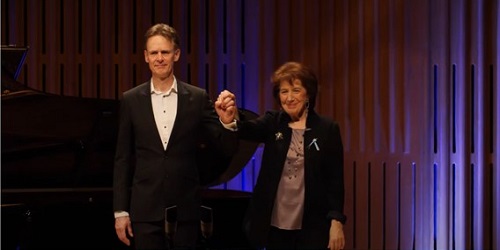The thirteen songs, setting poems by Rellstab and Heine, that Schubert’s publisher Tobias Haslinger grouped together, supplemented with an additional setting of Johann Seidl and published as Schwanengesang in 1829, the year after Schubert’s death, share the theme of love – yearned for, unrequited and lost. ‘Die Taubenpost’ (Pigeon Post) which Haslinger added – composed in October 1828, it was believed to be Schubert’s very last song – sits somewhat oddly alongside them, telling as it does of a young man whose loyal pigeon carries his messages, greetings and tears to his beloved’s house. Schwanengesang is also a little short to fill a full-length recital, and so singers tend to add some supplementary songs to flesh out the programme. At Leeds Lieder, Ian Bostridge and Imogen Cooper inserted between the groups of poems by Rellstab and Heine four further settings by Schubert of texts by Seidl, giving the latter a more equal place alongside the former and also offering a counter-thread of hope to the poems of absence and resignation.
Hearing the performance of Winterreise that Bostridge and Angela Hewitt presented at Wigmore Hall last month, I was struck by the insight communicated by what I described as Hewitt’s ‘measured rhetoric’ – and by the clarity of texture and form which communicated that insight. Here at the Howard Assembly Room in Leeds, Imogen Cooper’s playing similarly supported and inspired expressive singing from Bostridge – marked by characteristically personal nuances and heightening, but which held back from expressionistic drama and distortion.

The pictorialisms of ‘Liebesbotschaft’ (Love’s Message) – conjuring the flowing momentum of the little rushing brook, the flashes of sunlight on water as the upper notes within the right hand’s oscillating groups sparkled – were natural not mannered. Bostridge’s vocal phrases were relaxed, the breathing brilliantly controlled, with even colour and well-centred tone – the confidence of youth made manifest in sound. The quietening of the piano at the entry of the voice emphasised the dialogue between the voice and the bass as the latter echoes and varies the closing motifs of the melodic phrases, creating a strong conversation between the protagonist and the brook that he pleads with to carry his messages to his distant beloved, comfort her and whisper dreams of love – “Mein Bote sei du;/ Bringe die Grüße/ Des Fernen ihr zu”. Cooper’s subtle rubatos did indeed seem to be nature’s pliant response to such urgings.
In ‘Kriegers Ahnung’ the taut rhythm (a sharply articulated semiquaver in the dotted group) and curt following quaver created a stern air, as the warrior of the song’s title steeled himself in the face of anxiety and fear. The was a darkness in the tenor’s voice and intimations of suffering: “Von Sehnsucht mir so heiß” rose to a twist of pain on ‘heiß’, then drooped under the weight of longing. Strength and spirit were shored up in the lyrical expanse of hopeful sentiments – “Bald ruh ich wohl und schlafe fest” (Soon I will rest and sleep soundly) – but the final farewell, “Herzliebste – gute Nacht!”, was anything but restful, riven with a swell of foreboding.

The strophic ‘Frühlingssehnsucht’ was breathless, the whispering breezes, rushing brook and shimmering sun intoxicating the protagonist. Bostridge didn’t linger overly on the dissonant spiking of the short questions, replete with unresolved desire, which close each stanza, leaving the emphasis for the exclamation of the fourth stanza, “Nur du!” and confirming that only the beloved could free the Spring within his heart (an effect slightly lessened by an earlier slip with the text). In ‘Ständchen’ (Serenade) there was a weariness in the piano’s steady quavers, and in the slight slipping away of the voice at the end of the descending phrases – as if the poet-speaker did not quite believe that his song would fly from the quiet grove and reach his beloved. Bostridge was a little unsteady at the top in this song, and not quite precise in pitching some of the major/minor alterations, but in ‘Aufenthalt’ (Resting place), the paradox of ceaseless movement and futility, and thus the eternal frustrations of youth, were compellingly conveyed by the piano’s firmly anchored pulsing triplets and the low tethering of the vocal line: “Ewig derselbe bleibet mein Schmerz” (So my pain remains always the same).
Cooper’s dry stabbing and low stirrings at the start of ‘In der Ferne’ evoked the despair of the departing wanderer, forsaken by both beloved and the world. Bostridge’s strong low range captured the morbid mood, and his careful enunciation of the intricate ‘enden/ender/ende’ rhymes, the ebb and flow of the vocal phrases, and the interruption of the cadences during the transition to the tonic major in the final stanza intensified the co-existence of pain and rapture. ‘Abschied’ (Farewell), which ends the Rellstab settings, can feel inappropriately jolly, but the accompaniment’s harmonic digressions, and Cooper’s bristly staccatos and steely heightening created their own tension, and Bostridge was determined rather than jaunty.

The four extra Seidl songs followed the interval. The piano bass surged strongly in ‘Sehnsucht’ (Longing) and the tricky voicing in the right hand was brilliantly done. Bostridge was attentive to the subtle changes within the strophes, and here the major-minor shifts certainly did make their mark. There was light in the darkness too, the tenor evoking confidence in the closing assertion, “Wenn mich mein Los vom Liebchen warf,/ Dann fühl’ ich, daß ich singen darf” (Though fate has torn me from my sweetheart, At least I feel that I can sing!). ‘Bei dir allein!’ (Only with you) felt rather too fast, fraught rather than fiery (Schubert’s tempo marking is not too fast, ‘doch feurig’), affecting the tenor’s centring of the rapid notes – and, at one point Bostridge seemed to shoot ahead, leaving Cooper’s fingers dashing to catch up, which she did brilliantly. The dotted and straight rhythms were not always accurate either, a pity as they tug against the piano’s triplets, and though the first and last verses have subtle changes, Bostridge sang the final form on both occasions. However, ‘Der Wanderer an den Mond’ (The traveller to the moon) had a folklike simplicity of the kind that conveys human truths and ‘Im Freien’ (Outdoors) again one sensed the reassurance of love as the glimmering snowflakes and illuminating moonbeams lifted the mood of the nocturnal scene, the initial elegant vocal phrasing subsequently enlivened by vigour and brighter colours.
The comfort didn’t last long, though, ‘Der Atlas’ following segue, Cooper’s almost violent piano introduction shattering the calm. There were angry but also probing emotions here from Bostridge, and the wrenching, high final phrase, “Die ganze Welt der Schmerzen muß ich tragen”, was well-controlled, the tenor ‘squeezing out’ the frustration and rage that he must bear the sorrows of the world. And, the text was evocatively pointed in ‘Ihr Bild’ (Her Portrait) too: “Ich stand in dunkeln Träumen/ Und starrte ihr Bildnis an” (I stand in dark dreams, staring at her portrait). The emotions lurched here between a dreamy otherworldliness and snarling intensity, while the force of the final declaration conveyed the bewilderment and denial of loss. ‘Das Fischermädchen’ (The Fisher Maiden) was full of youth’s joys and hopes, but not too impetuous; ‘Die Stadt’ (The town) evoked the bitterness of Winterreise, in its Gothic scene – the town swathed in mist, damp ruffling breezes, the eeriness of the strange boatsman – and its presentation of nature as indifferent, cruel even.

‘Am Meer’ is the sort of song Bostridge sings so beautifully: slow, still, soft long lines through which the sweet tone is sustained, even as nuances are introduced. With the image, “Aus deinen Augen liebevoll Fielen die Tränen nieder” (And sweetly from your eyes Tears began to fall), Bostridge leaned into the falling phrases, but when the motif returned he allowed the phrase to fade more fraily, the decorative turn resolving the cadence that was previously open-ended: an admission of resignation and defeat. ‘Der Doppelgänger’ had a terrible fixity, preparing for the tortured revelation, though there was increased movement towards the image of the man standing before the beloved’s house, “Und ringt die Hände vor Schmerzensgewalt” (Wringing his hands in grief), and a roar of pain when the man recognised his own features, “meine eigne Gestalt”.
Whatever its incongruence with the preceding thirteen songs of Schwanengesang, the fuller textures, easy sway and the regularity of the melody and structure of ‘Die Taubenpost’, as well as the piano’s bright flourishes, were welcome, confirming that absence and longing are merely the messenger of a faithful heart, “Die Botin treuen Sinns”.
Claire Seymour
Ian Bostridge (tenor), Imogen Cooper (piano)
Schubert: Schwanengesang – (Ludwig Rellstab settings) ‘Liebesbotschaft’, ‘Kriegers Ahnung’, ‘Frühlingssehnsucht’, ‘Ständchen’, ‘Aufenthalt’, ‘In der Ferne’, ‘Abschied’; ‘Sehnsucht’, ‘Bei dir allein!’, ‘Im Freien’, ‘Der Wanderer an den Mond’; Schwanengesang – (Heinrich Heine settings) ‘Der Atlas’, ‘Ihr Bild’, ‘Das Fischermädchen’, ‘Die Stadt’, ‘Am Meer’, ‘Der Doppelgänger’, ‘Die Taubenpost’ (Johann Gabriel Seidl)
Howard Assembly Room, Leeds; Saturday 30th April (live stream).